Feeding India's underprivileged: How Akshaya Patra coped with the pandemic
In an exclusive interview, Shridhar Venkat, chief executive officer of The Akshaya Patra Foundation, shares with Surya Kannoth the initiatives he took to fight the pandemic and how the food supply chain has kept going, despite all odds.

At a time when the Covid-19 pandemic sent nations into a tizzy declaring a state of lockdown, where the entire human community began to socially distance themselves from each other, frontline workers be it healthcare professionals or workers catering to essential supplies worked tirelessly to tend to the needs and necessities of the society at large.
During these troubled times, The Akshaya Patra Foundation, a name which is synonymous for the world's largest mid-day meal programme for children, began to feed those from marginalized communities, such as daily wage earners, labourers at construction sites among others across the nation. The Akshaya Patra Foundation has now served over 80 million meals in the form of freshly cooked food and food relief kits with essential groceries over the last six months across 52 locations in 17 states and two union territories to address food insecurity that is compounded as a result of the pandemic.
In an exclusive interview, Shridhar Venkat, chief executive officer of The Akshaya Patra Foundation, shares with Surya Kannoth the initiatives he took to fight the pandemic and how the food supply chain has kept going, despite all odds. Edited excerpts:
How have the last six months been for you?
The last six months have been tough and challenging. But Akshaya Patra’s passion is ensuring that hunger gets addressed across the country. We are a strategic school meal programme with the vision that no child in India will be deprived of primary education because of hunger. But when pandemic struck, we quickly repurposed our strategy. And we moved from food for education to food for relief. So the last six months have been very unprecedented, tough, challenging, and at the same time, we also feel satisfied that we have done our bit.
This pandemic is here to stay for some time and schools, obviously, will continue to remain shut for a major part of this year. Were you really prepared to deal with this crisis?
Akshay Patra is known for crisis management; whenever a disaster has struck our country, we have been put into service – be it the floods in Chennai or Kerala, earthquake in Nepal and many other disasters. We are part of the National Disaster Response Centre within the Union Government. Because of the infrastructure that Akshaya Patra has deployed in all the 52 locations that we are operating, we were in one sense, braced up to handle any kind of calamity; that said, we were not ready for this pandemic.
Did you face any hurdles in terms of procurement of vegetables and grocery, especially in the initial days of the lockdown? What were those challenges and how did you overcome those?
When it comes to procurement, we have a central sourcing team. And of course, when the pandemic struck, everything came to a halt in our country from a supply chain perspective. But what really helped us was our strong relationship with the local municipal body and the local government. We are a public-private partnership, and we got tremendous support from the government authorities. For instance, APMC yards were not allowing movement of trucks but the government helped us in allowing the movement of trucks specifically for Akshaya Patra. So, it is only because of the phenomenal support we received from the government that we were able to do over 80 million servings in the last six months. Another learning that we had was that the strength of public-private partnership came to the fore - how the government, civil society and private organisations came together to serve the society.
Can you tell us more about your partnership with SOLV and how did it really help you manage your supply chain practices, and keep it operational during these trying times?
SOLV helped us in terms of connecting with our network of suppliers, vendors, etc, especially at this juncture. Though we have a very stringent vendor qualification mechanism, some of the vendors are currently not operational so SOLV helped us in connecting with people who can supply raw materials to us.
Did you face any issues with regard to shortage of drivers during this crisis?
Yes, we did face concerns, but as I mentioned to earlier, the government supported us wholeheartedly.
For example, we had booked a large Kalyana Mandapa in Palace Grounds to pack large quantities of grocery boxes - 200,000 boxes to be packed for Bangalore alone. So here, while we were doing the packing, the government arranged the pickup of the boxes in their vehicles.
How did you really ensure on-time delivery of meals on a daily basis, especially in this crisis, because you have to reach a particular location at a certain time only; you cannot be delayed beyond a certain time?
Akshaya Patra has fed 3 billion meals in the last 20 years. The 3 billionth meal was commemorated with honourable Prime Minister early last year. So one of the hallmarks of Akshaya Patra is reaching food on time. While our operations team has the expertise to ensure that we reach on time, we also got tremendous support from the local authorities in terms of getting the permits to navigate freely to various locations.
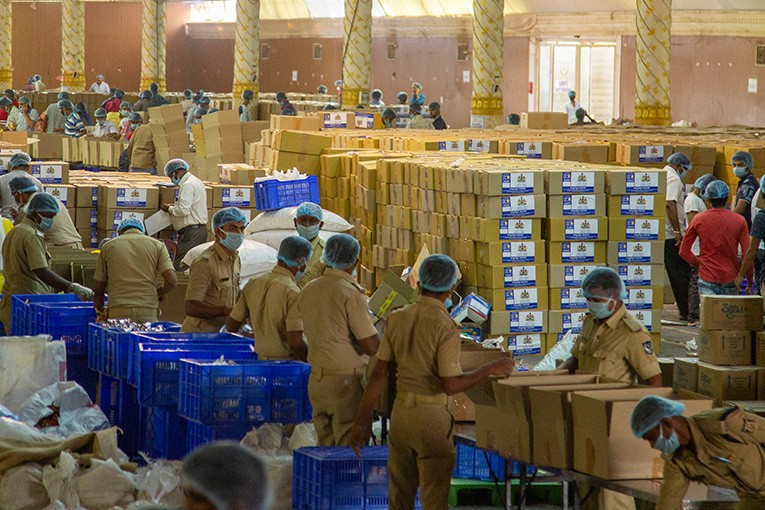
The Akshaya Patra Foundation hired a large Kalyana Mandapa in Palace Grounds in Bangalore to pack 200,000 grocery boxes to be distributed within Bangalore alone
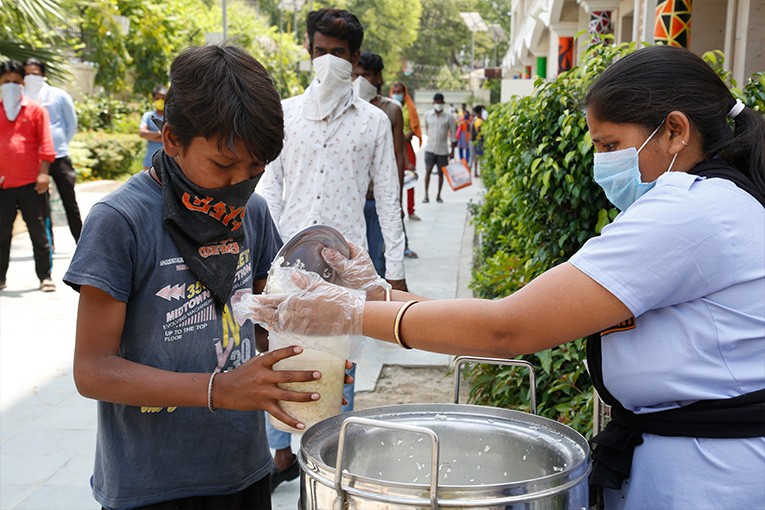
The Akshaya Patra volunteer distributing dry groceries to the needy in Ahmedabad
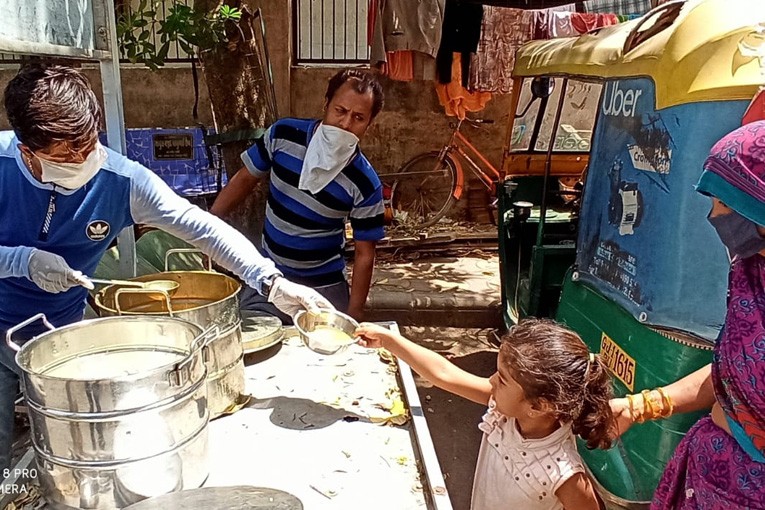
Cooked meals being served to the underprevileged in Gujarat
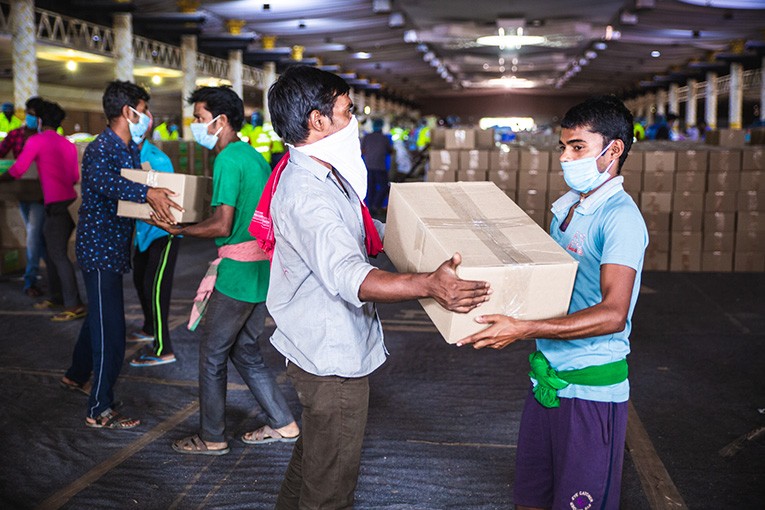
Dry grocery boxes being packed and distributed in Bangalore
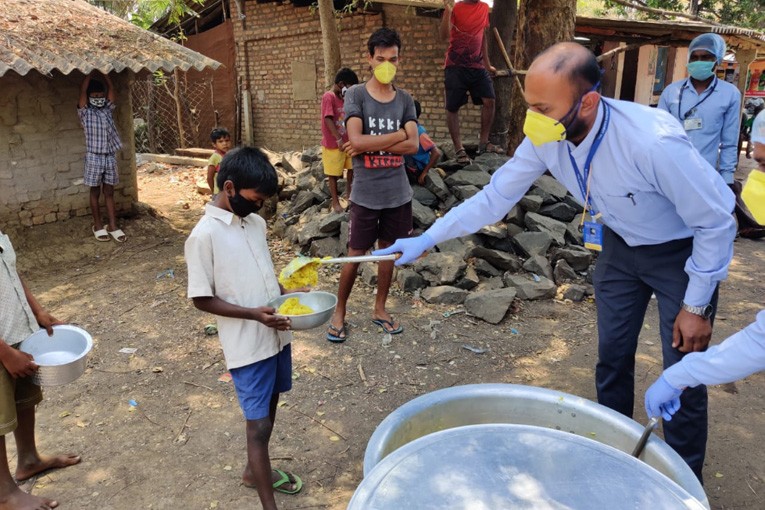
Meals being served to a child in Silvassa
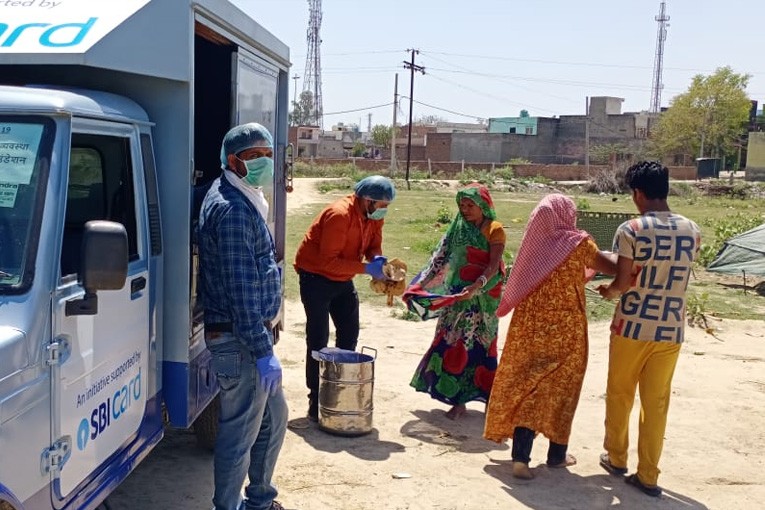
Akshaya Patra volunteers distribute cooked meals and relief kits
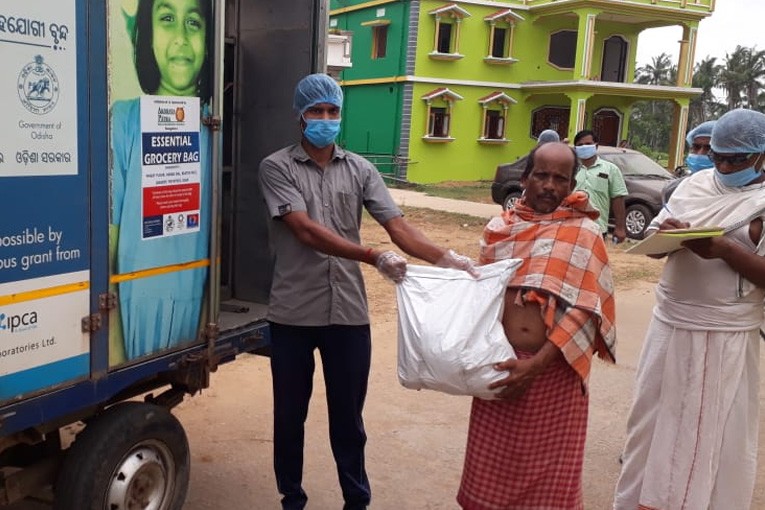
People receiving grocery boxes from volunteers. Each grocery box contains ration for 21 days for 42 adult meals with quality-checked ingredients
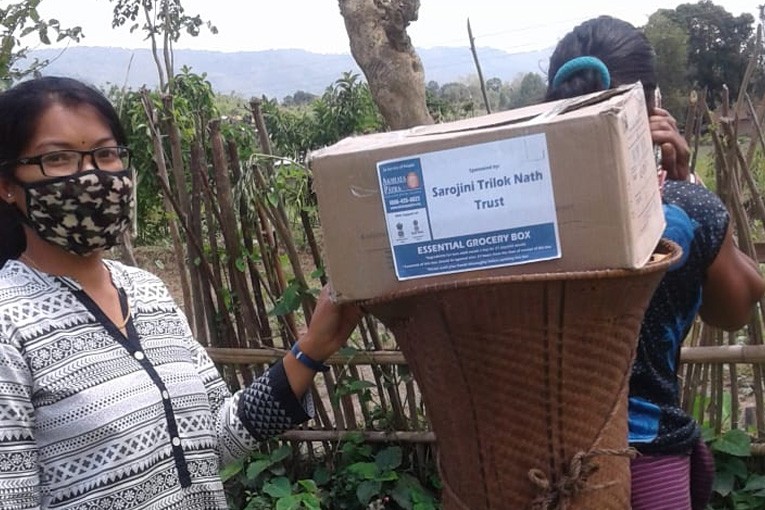
People working in tea estates in Assam receive essential groceries from volunteers
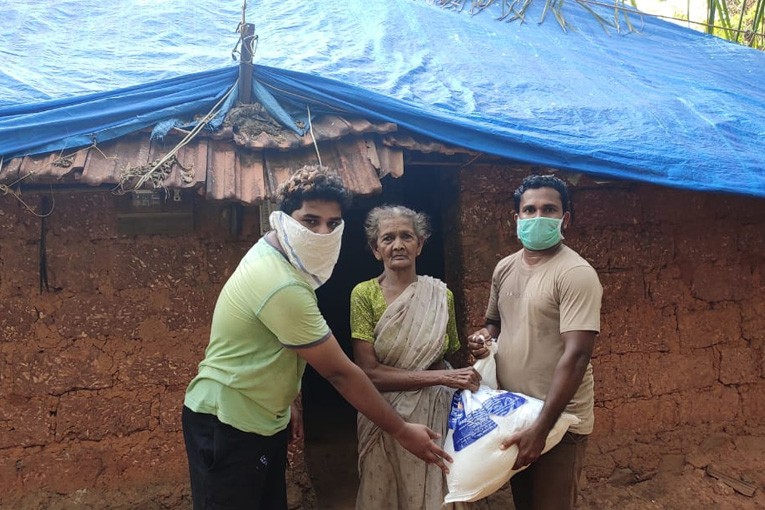
Volunteers reach out to the underprevileged in Mangalore
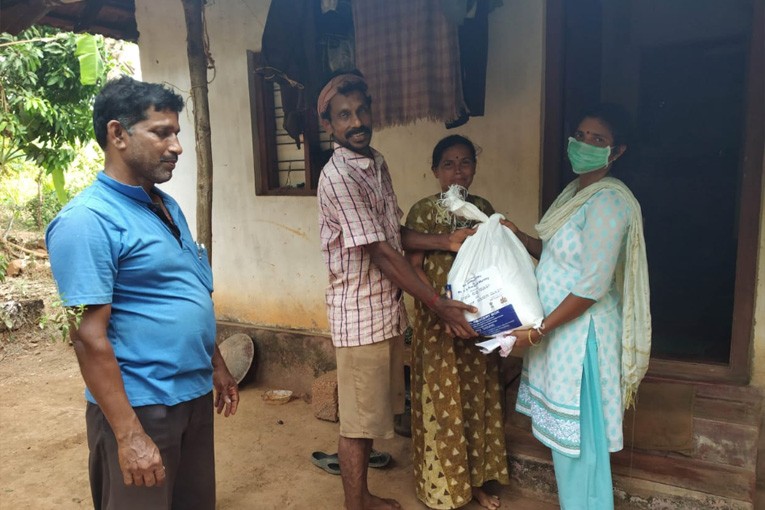
Groceries being delivered to homes of daily wage workers
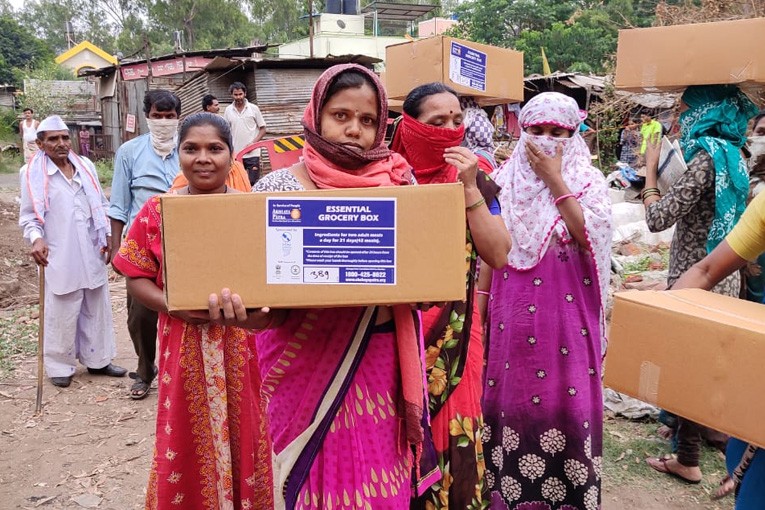
People receive essential grocery boxes in Pune
How did you deal with food wastage? At this point of time, there are chances of food being wasted since you will be making more meals than the actual number of people who need to be served as against serving children in schools where you are aware of the count.
When we carried a truckload full of food near Yeshwanthpur Railway Station in Bangalore, there was a queue that ran almost half a kilometre to collect the food. That shows the high demand for food. One good thing about Akshaya Patra is that we have multiple kitchens within a city. For instance, in Bangalore, we have three kitchens and a network of facilities from where we can reach food faster. So in that way, food wastage was never a big issue. This initiative was carried out in 18 states and two union territories to about 52 locations. In areas where we did not have our presence, we distributed grocery boxes which carried ration for about 21 days for 42 adult meals with quality-checked ingredients and all essentials. So in effect, we distributed cooked food to the locations where we had our kitchens and grocery boxes in the others.
Once schools actually open, have you planned any safety protocols/measures on how you will continue to serve the midday meals to children?
We are very eagerly awaiting for schools to start because our primary purpose is to end classroom hunger and our survey shows that children are in need of a midday meal. So, we have a solid quality organization in place within Akshaya Patra. So all the protocols are ready. We want to closely work with the school authorities and even if the schools open tomorrow, we are all set for serving the meals.
What is your next milestone and how are you working to achieve it?
Our next milestone is to reach 5 million children by 2025. So we are working on ensuring how we can sustainably grow - that's one of the key challenges for Akshaya Patra. Here again, the supply chain plays a very important role because to deliver this food to different places, Akshaya Patra spends about ₹2.50 per meal. So, we are working on optimizing the supply chain costs. We are also trying to come up with models which will reduce our costs, and at the same time, reach out to more children in a short span of time. We are looking at newer models, newer innovations so that we can meet this goal of 5 million children. It is an aspirational goal - if we reach there, it's very good. When we set out the goal of 1 million children by 2010, we reached the goal a year earlier.
Any other revelations that you would like to share with us?
I could personally see that compassion in our country went up during this crisis. We received the support of 100,000 donors in just three months. Ours is a compassionate country and it is there in our culture. This was something I knew of but during this crisis, it was insightful to see it working - to see how people have come together - it's like fighting a war. And the public-private partnership was a big learning. We had a war room on WhatsApp where the leading authorities from different locations were coordinating with our operations and leadership team. So, quick and swift actions were taken. It was great to see how all the stakeholders came together in a short period of time to address this calamity.
This interview was originally published in Indian Transport & Logistics News' September - October 2020 issue.



